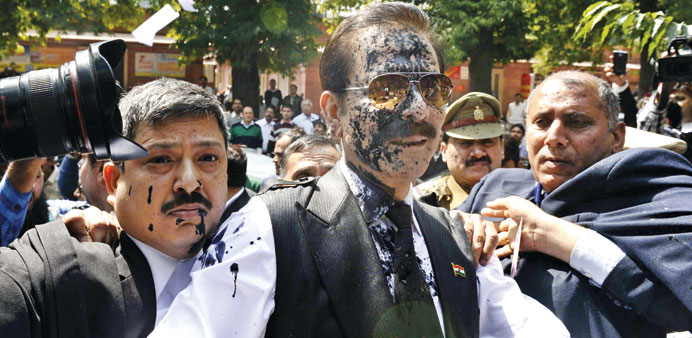Agencies/New Delhi
The Supreme Court yesterday jailed the head of Sahara business group after he apologised to the judges for failing to show up for a hearing over repaying billions of rupees to small investors.
Flamboyant billionaire Subrata Roy, who was remanded in custody for a week, said he was sorry for not personally attending a hearing last week, which had prompted the frustrated court to order his arrest over the 18-month old case.
“I sent an unconditional apology. My reasons for not appearing before the court were genuine,” Roy told the court during a hearing yesterday, referring to his sick, elderly mother.
The court remanded Roy, who is often photographed with Bollywood stars and whose Sahara group says it’s worth $11bn, to Tihar, India’s largest jail, until he could present a “concrete proposal” on repayment to investors.
Surrounded by media, Roy was earlier attacked by a protester who threw ink in his face as he arrived at the court for the hearing over delays in returning money collected through an illegal bond scheme.
As guards whisked Roy away, the shirtless protester yelled “thief” before lawyers and Sahara supporters started beating him up, as police dragged him away from the court.
During the hearing, the 65-year-old tycoon reassured the court that Sahara would pay back money, collected from rural savers through the bond sales, within three to four months.
Roy told the court that he had already given more than Rs50bn ($800mn) to the Securities and Exchange Board of India (Sebi), the securities regulator, which is overseeing the repayment process.
A two-judge bench remanded Roy and two other directors in custody until March 11 when it wanted to hear the more detailed repayment plan.
Judge K S Radhakrishnan said he was “not happy” with proposals so far.
Roy was arrested on Friday and held at a forest department guest house in the northern city of Lucknow before travelling to Delhi for the hearing.
Sahara, a famous name in India through its former sponsorship of the national cricket team, raised about Rs200bn ($3.2bn) from savers in a process judged by authorities in 2012 to be against the law.
Sahara maintains that the company was only helping small investors outside the banking system and that it has never defaulted on them.
The Sahara empire extends from a stake in a Formula One racing team to a sprawling Indian luxury township, the iconic New York Plaza Hotel and Grosvenor Hotel in London.
“The question is money. Where is the money and when will it be paid,” said Dushyant Dave, a Supreme Court lawyer who has represented Sahara in the past.
The Supreme Court, which has expressed frustration at Sahara’s conduct, had ordered Sahara to disclose the details and source of funds from which it said it repaid investors, but a lawyer for the regulator told the court in late January that Sahara had not given the details.
Sahara had offered to give Sebi title deeds of properties it said were worth Rs200bn as security, but the regulator said the properties were far over-valued. The court also ordered that Sahara not sell any of its property.
Sahara’s core business includes selling financial products, largely to small investors in towns and rural areas. It was two such products, later ruled illegal, that drew Sebi’s attention.
Critics, including activist groups, argue Sahara’s investment products are designed to evade regulatory oversight and that the company lacks transparency on the source and use of funds.
Roy started out from the city of Gorakhpur in the hardscrabble east of Uttar Pradesh and styles himself a man of the people, though he also makes a show of opulent living and is often photographed with celebrities.
Like many Indian business leaders, he is perceived to be close to politicians.
He is often described in the media as a billionaire, but last year said his assets were less than $1mn.
His titles at Sahara are chairman and managing worker, and he refers to himself as “guardian of the world’s largest family” of more than 1mn employees and agents.
Roy, who often wears a white shirt, black waistcoat and black tie bearing a Sahara logo, last May dismissed the suggestion that he was relishing his headline-making dispute with Sebi.

The Sahara group chairman Subrata Roy with his face smeared in ink thrown by a protester identified as Manoj Sharma arrives at the Supreme Court in Ne
